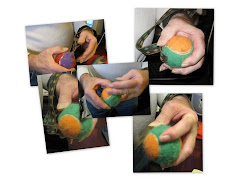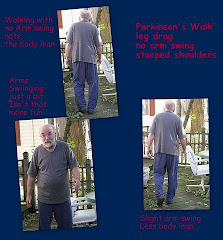 Is there a link between fruit and Parkinson's disease?
Is there a link between fruit and Parkinson's disease?There has been speculation that because of pesticides, insecticides, herbicides, plant-borne toxins, there may link between high fruit consumption and Parkinson's. In the 34 year study initiated in 1965, a link between vitamin C to PD in the 34 year study of Japanese-American men in Hawaii did not bear fruit.
However, studies suggest that various tropical fruits are related to parkinsonian syndromes. Connections have been found between specific tropical fruits and parkinson-like symptoms. There is certainly the ever-present risk of continuing to ingest pesticides, herbicides and what not from any fruit or vegetable not properly cleaned.
Clean your fruit and eat it too.
Washing fruit and vegetables is something we do to remove microbes, soil contaminants, traces of the other people who handled the produce before it came home, wax and of course as much pesticide as possible. Unless you buy strictly organic, you're going to get pesticide residue on and in the produce. As a matter of fact, organic does not mean that there won't be traces of organic pesticides, not all of which are good for the inside of a person.
Wash your own hands with soap & water for at least 30 seconds before and after handling the fruit.
Clean all cutting boards and utensils, including cleaning brushes which will come into contact with the fruit - before and after
Only lettuce can be washed before storing. Do not wash other fruits & vegetables until ready to use.
Wash most fruits and vegetables under running slightly warm water (to bring out the flavor) between 80-110 degrees F, using brush on smooth skinned fruit when possible. Dry with clean cloth or paper towel. Salad veggies should be washed in cold water to maintain crispness.
Needless to say on foodstuff you don't use bleach or detergent - you don't eat them - they are for the utensils. You can use FIT or baking soda to clean fruits and veggies. But remember that both vinegar and baking soda will alter the taste. Some people make a mixture of vinegar and hydrogen peroxide. I'm not sure if that is a PWP thing because of the H2O2.
Do keep each separate in storage and don't precut because that will cause a nutrient loss. We keep separate cutting boards for fruit/veggies and for meat.
The general rule is: Don't Eat Green, Immature, or Developing Fruits, especially raw! Wait until ripe.
So what about those tropical fruits which should be avoided?
A few fruits to avoid for now are members of the Annonaceae family: Pawpaw, custard apples and pomme cannelle contain nerve compound toxins have been associated with some parkinsonism and PSP (progressive supranuclear palsy)
Most certainly avoid Soursop, a fruit of the French West Indies has small amounts of annonacin which kill dopamine neurons. It appears that a high rate of treatment (levadopa) resistant Parkinson-like symptoms in the French West Indies may be linked to soursop (annona muricota) consumption. Although these plants also have medicinal value as anti-fungals, bacteriostatics and cytostatics having several compounds which can be extracted as flavinoids, alkaloids and acetogeins including one thought to have anti-HIV and anti-cancer effects, they do not appear to be good for Parkinson's.
Exotic Tropical Fruit
- achee, akee, ackee, ahee - under ripe fruit can cause vomiting and death and was banned by USDA from import in 1973 because unripe fruit contains toxins, the amino acids hypoglycin A & B which sicken anyone eating it as the fruit protects its seeds. Now only ripened achees lacking seeds,membrane rind can be used in canning for USA import. The cooked pulp is supposed to be delicious. No, it doesn't taste like chicken; apparently it tastes more like scrambled eggs when made with salted cod.
- cashew apple - don't eat the grayish stem (actually the fruit) as it contains toxic oils
- custard apple, paw paw, soursop, cherimoya, guanabana, sherbet fruit
 - don't eat - can cause parkinsonism which is not responsive to levadopa treatment - don't eat seeds or peels
- don't eat - can cause parkinsonism which is not responsive to levadopa treatment - don't eat seeds or peels - rose apple - seeds are poisonous
- starfruit - contains a neurotoxin not present in other fruits = affects brain, nerves, kidneys
normal kidneys will filter, kidney problems (moderate, chronic kidney failure patients) will not filter - toddy palm seeds - the red fruit around the seeds contains oxalic acid which burns - don't handle and certainly don't eat - it is the seeds which are eaten
Guide to Organic Pesticides from Mother Earth News
Nutritional Data - know what you eat
"Oxalate plays a key role in the neurotoxicity of star fruit"
A star fruit by any other name
Tropical fruit, herb teas linked to Parkinson's
Tropical fruit linked to Parkinsonism
Custard apple family (Annonaceae)
Plant Poisonings: hypoglycemics
Tomorrow: the user-friendly fruits and veggies














A couple of comments to add to an excellent article.
ReplyDelete1) The protein thing is often overblown. Dr. Lieberman, on his old website, said that it actually applies to about 25% of us. I know that I thrive on protein and do best if I start the day with meds and a boiled egg. The only way to know is to test yourself.
2) Every PWP should evaluate their relationship to wheat, particularly if they are blood type O. Hypersensitivity to particular proteins in the gluten can produce neurological symptoms and aggravate those of PD.
Thank you for those helpful insights.
ReplyDeleteSince this comment was received, I'm sure that many of us received the We Move.org newsletter about the study presented at the American Academy of Neurology on 4/29/09 in which Dr Y Tanaka, H Nishada, M Yamada, T Sakuri, Y Hayashi, A Kimura I Hozumi and T Inzuka discussed the fact that Motor Fluctuations in PD may not be influenced by gastric emptying. PD patients have slower stomach emptying than non-PD patients. Delayed "on time" caused by the slow stomach emptying only affected 50% of the PD patients in the study.
It would appear that gluten sensitivity which can manifest as many symptoms other than intestinal distress is probably much more common than most of us realize. One symptom to be aware of is depression.
This text is very helpful for the people .I am thankful to you.
ReplyDeletesuman
Free Satellite Tv
It has been revealed that farm workers who were exposed to pesticides were most likely to develop Parkinson disease. Dependence on organochlorines has been known to be a problem as it includes the infamous DDT and chlordane. US government has banned these chemicals.
ReplyDeleteHi, I lived for many years in South East Asia with my grandparents. My Grandmother had PD and so do I. The annonaceae fruits were very popular in our family, especially soursap, custard apple etc. I often wonder whether there is any real substantial literature on this in the West, as these fruits are relatively rare here. Or research, for that matter. The fact that these fruits are so strongly linked to PD could provide avenues for research too, into the mechanisms that cause neurons to malfunction and die.......
ReplyDeleteYou classify the "paw paw" as a tropical fruit. Are you referring to the papaya which is often called a paw paw in the tropics or are you referring to the non-tropical pawpaw which is native to North America?
ReplyDeleteThe native North American pawpaw is not the fruit to which various studies have pointed. We are indeed talking about the tropical fruits of the confusing references; sometimes called pawpaw and sometimes papaya.
ReplyDeleteFor additional information you can refer to a 1999 French West Indies study by doing a cut and paste of this link:
http://www.ncbi.nlm.nih.gov/pubmed/10440304
Other helpful information was found during the 34 year Hawaiian study which has been referenced in other articles found at this blog site.
They are not talking about the tropical papaya. They are talking about the non-tropical pawpaw "of the Annonaceae (custard apple or pawpaw family)".
ReplyDelete